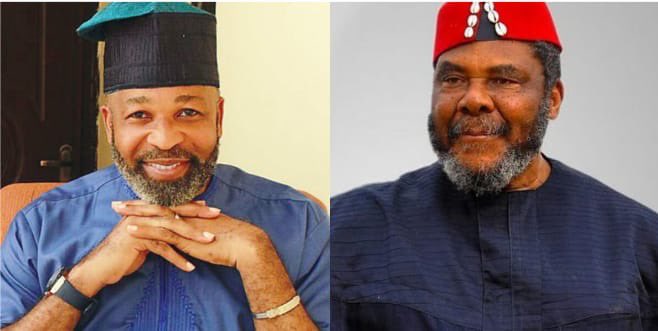
Yemi Solade Claims Seniority Over Pete Edochie in Nollywood
Veteran Nollywood actor Yemi Solade has claimed that he ventured into acting before the iconic Pete Edochie, despite being younger in age.
Speaking on the show Father’s Path with Tope, Solade recounted his early beginnings and his significant contributions to the Yoruba arm of the Nigerian film industry.
“I’m senior to Pete Edochie in the acting world—I started before him, even though he’s older than I am,” he said. “At age 17 in 1977, I represented Nigeria as its Youngest Actor. I’ve now spent 48 years in the industry and I’m still going strong.”
Solade also weighed in on ongoing debates about Nollywood’s roots, pushing back against narratives that credit other segments of the industry with founding Nigeria’s film scene.
He argued that the Yoruba film industry had long been producing films, even though it initially lacked proper documentation and commercial packaging through cassettes. According to him, this lack of early formal archiving led others to falsely claim ownership of Nollywood’s beginnings.
“The first Nigerian, Ade Ajiboye ‘Big Abass’, [made] the first home video in this country. We’ve been doing it—there was film, the celluloid and everything. We had the likes of Ogundes, we had Baba Salas, we had Ade Afolayans, Kunle’s father; we had Dr Ola Balogun, who is still around, and so many other big names, most of them are gone now,” he said.
Recalling the early days of home video, he explained how actors experimented with camcorders to record stage dramas, which were then transferred to cassettes and distributed to the public via shop displays.
“Even when home video was starting, it was just an experiment that was carried out by the likes of Muyideen Alade Aromire. We were all doing this drama, and then they just brought this camcorder, let’s record what we are doing, which was documented in a cassette and was arranged in bookshelves. So, you as a shop owner, would introduce the cassette for people to buy; it all started like that.”
Solade maintained that the Yoruba industry’s failure to document its early work gave rise to the misconception that it came into the industry later than other segments.
“My people in the Yoruba setting didn’t document anything; that was why the other people in the industry just stepped in to say they started it. ‘Hey shut up’; when people like us are here, we will let you know you didn’t start anything,” he stated.
He further noted that the media attention enjoyed by other sectors of Nollywood contributed to the spread of the narrative.
“They could say that because they romance the media, but the Yoruba industry was just acting. Most of them weren’t schooled; they didn’t know anything about the media, and they enjoyed themselves. Adebayo Salami is alive; he will tell you a deeper story that I’m telling you, he’s older than me. Jide Kosoko is alive, we all work together.”
Solade’s comments have reignited conversations around Nollywood’s origins and the underrepresentation of Yoruba contributions to the film industry’s development.
- Natasha Briefly Detained At Abuja Airport Over Watch List
- 13 Dead, 236 Hospitalised As Cholera Outbreak In Niger Raises Concerns Over Nationwide Spread
- Discos At War With 36 States Over Controversial Tariff Slash
Share your story or advertise with us: Whatsapp: +2348033202396 Email: sentinelnewsng@gmail.com







